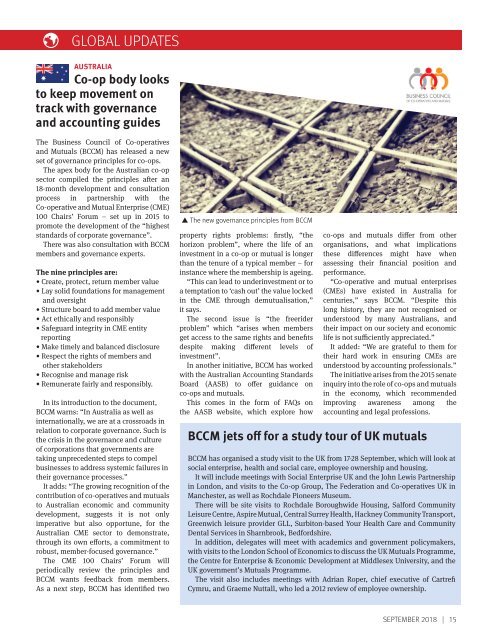SEPTEMBER 2018
The September edition of Co-op News looks at how co-ops cab maintain co-operative values and principles while operating in competitive markets and how this can be a challenge for large co-ops. We examine current research into what influences a co-op’s take on the traditional values of self-help, self-responsibility, democracy, equality, equity and solidarity.
The September edition of Co-op News looks at how co-ops cab maintain co-operative values and principles while operating in competitive markets and how this can be a challenge for large co-ops. We examine current research into what influences a co-op’s take on the traditional values of self-help, self-responsibility, democracy, equality, equity and solidarity.
You also want an ePaper? Increase the reach of your titles
YUMPU automatically turns print PDFs into web optimized ePapers that Google loves.
GLOBAL UPDATES<br />
AUSTRALIA<br />
Co-op body looks<br />
to keep movement on<br />
track with governance<br />
and accounting guides<br />
The Business Council of Co-operatives<br />
and Mutuals (BCCM) has released a new<br />
set of governance principles for co-ops.<br />
The apex body for the Australian co-op<br />
sector compiled the principles after an<br />
18-month development and consultation<br />
process in partnership with the<br />
Co-operative and Mutual Enterprise (CME)<br />
100 Chairs’ Forum – set up in 2015 to<br />
promote the development of the “highest<br />
standards of corporate governance”.<br />
There was also consultation with BCCM<br />
members and governance experts.<br />
The nine principles are:<br />
• Create, protect, return member value<br />
• Lay solid foundations for management<br />
and oversight<br />
• Structure board to add member value<br />
• Act ethically and responsibly<br />
• Safeguard integrity in CME entity<br />
reporting<br />
• Make timely and balanced disclosure<br />
• Respect the rights of members and<br />
other stakeholders<br />
• Recognise and manage risk<br />
• Remunerate fairly and responsibly.<br />
In its introduction to the document,<br />
BCCM warns: “In Australia as well as<br />
internationally, we are at a crossroads in<br />
relation to corporate governance. Such is<br />
the crisis in the governance and culture<br />
of corporations that governments are<br />
taking unprecedented steps to compel<br />
businesses to address systemic failures in<br />
their governance processes.”<br />
It adds: “The growing recognition of the<br />
contribution of co-operatives and mutuals<br />
to Australian economic and community<br />
development, suggests it is not only<br />
imperative but also opportune, for the<br />
Australian CME sector to demonstrate,<br />
through its own efforts, a commitment to<br />
robust, member-focused governance.”<br />
The CME 100 Chairs’ Forum will<br />
periodically review the principles and<br />
BCCM wants feedback from members.<br />
As a next step, BCCM has identified two<br />
p The new governance principles from BCCM<br />
property rights problems: firstly, “the<br />
horizon problem”, where the life of an<br />
investment in a co-op or mutual is longer<br />
than the tenure of a typical member – for<br />
instance where the membership is ageing.<br />
“This can lead to underinvestment or to<br />
a temptation to ‘cash out’ the value locked<br />
in the CME through demutualisation,”<br />
it says.<br />
The second issue is “the freerider<br />
problem” which “arises when members<br />
get access to the same rights and benefits<br />
despite making different levels of<br />
investment”.<br />
In another initiative, BCCM has worked<br />
with the Australian Accounting Standards<br />
Board (AASB) to offer guidance on<br />
co-ops and mutuals.<br />
This comes in the form of FAQs on<br />
the AASB commentary<br />
website, which explore how<br />
co-ops and mutuals differ from other<br />
organisations, and what implications<br />
these differences might have when<br />
assessing their financial position and<br />
performance.<br />
“Co-operative and mutual enterprises<br />
(CMEs) have existed in Australia for<br />
centuries,” says BCCM. “Despite this<br />
long history, they are not recognised or<br />
understood by many Australians, and<br />
their impact on our society and economic<br />
life is not sufficiently appreciated.”<br />
It added: “We are grateful to them for<br />
their hard work in ensuring CMEs are<br />
understood by accounting professionals.”<br />
The initiative arises from the 2015 senate<br />
inquiry into the role of co-ops and mutuals<br />
in the economy, which recommended<br />
improving awareness among the<br />
accounting and legal professions.<br />
Co-operative and Mutual Enterprise (CME)<br />
Governance Principles<br />
Incorporating recommendations, guidance and<br />
1st Edition, July <strong>2018</strong><br />
BCCM jets off for a study tour of UK mutuals<br />
BCCM has organised a study visit to the UK from 17-28 September, which will look at<br />
social enterprise, health and social care, employee ownership and housing.<br />
It will include meetings with Social Enterprise UK and the John Lewis Partnership<br />
in London, and visits to the Co-op Group, The Federation and Co-operatives UK in<br />
Manchester, as well as Rochdale Pioneers Museum.<br />
There will be site visits to Rochdale Boroughwide Housing, Salford Community<br />
Leisure Centre, Aspire Mutual, Central Surrey Health, Hackney Community Transport,<br />
Greenwich leisure provider GLL, Surbiton-based Your Health Care and Community<br />
Dental Services in Sharnbrook, Bedfordshire.<br />
In addition, delegates will meet with academics and government policymakers,<br />
with visits to the London School of Economics to discuss the UK Mutuals Programme,<br />
the Centre for Enterprise & Economic Development at Middlesex University, and the<br />
UK government’s Mutuals Programme.<br />
The visit also includes meetings with Adrian Roper, chief executive of Cartrefi<br />
Cymru, and Graeme Nuttall, who led a 2012 review of employee ownership.<br />
1<br />
<strong>SEPTEMBER</strong> <strong>2018</strong> | 15


















